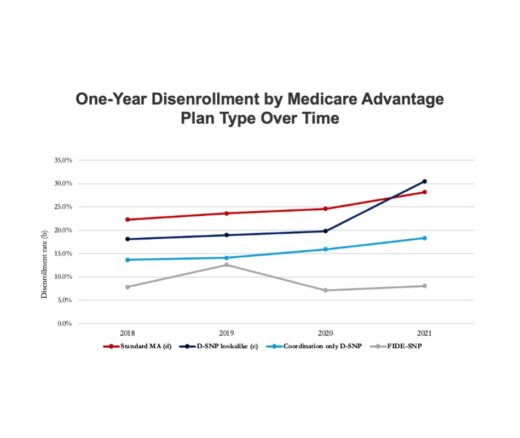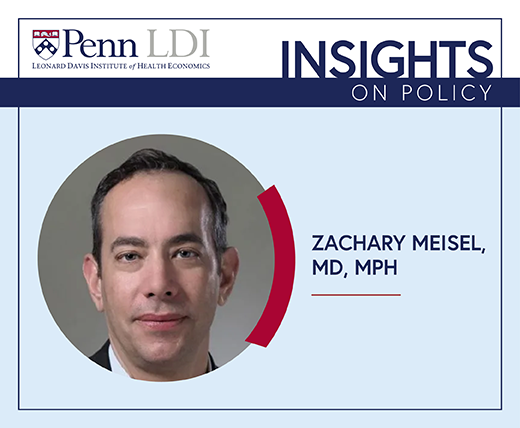Fragmented Geographic Distribution of Providers Suggests Limited Access to Basic Health Care for Dual Medicaid-Medicare Beneficiaries
Less Than 1% of Clinical Practices Provide 80% of Outpatient Services for Dually Eligible Individuals
Blog Post

A silver lining of the COVID-19 pandemic was the growth of telemedicine, which had previously been constrained by a web of payment and regulatory obstacles.
Before the pandemic, providers were generally required to hold a license in the state where the patient was located when the visit occurred–not a barrier for traditional, in-person care but a potential challenge for virtual care. For example, where I practice in Philadelphia, it is common to care for patients from our neighboring states of New Jersey and Delaware. Before the pandemic, if a Philadelphia-based physician did not have a license in these neighboring states, they could not provide telehealth services to those patients.
At the start of the pandemic–to maintain access while limiting in-person contact–states introduced waivers to support the use of telemedicine, including measures to relax licensure rules and let physicians and other practitioners provide care across state lines.
These licensure waivers generally took the form of either offering pathways to emergency licensure for out-of-state providers or recognizing licenses from other states, as long as they were active and in good standing.
Unfortunately, most of these pandemic-era waivers, which were often tied to the public health emergency, did not survive. Little is known about the impact this has had on patients’ access to care.
When telemedicine waivers were in effect, patients who lived near state borders were more likely to use out-of-state telemedicine services. These patients mostly had virtual visits with primary care or mental health providers who they had previously seen in person. In other words, these visits were largely (though not exclusively) routine care for people who happened to live near an arbitrary geographical boundary. As waivers expired, stories emerged of patients being compelled to return to appointments in person or being asked to drive across state lines to hold telemedicine appointments from their car.
My study team, including LDI Executive Director Rachel M. Werner, suspected this was only part of the story–that some patients and providers who had benefited from the pandemic-era flexibilities would decide it wasn’t worth the trouble and stop seeing each other altogether.
Leveraging a collaboration between LDI and Elevance Health (formerly Anthem), we studied claims data to identify out-of-state patient-provider relationships from patients living in eight states; three states where licensure waivers had expired during our study period, and five states where waivers had continued. We then compared what happened in these relationships.
We found that the expiration of these state waivers was associated with 24% lower odds of out-of-state relationships continuing in any capacity, whether via telemedicine or in person. Perhaps not surprisingly, this effect was more pronounced among relationships where the patient and provider were geographically farthest apart, and reverting to in-person visits was less feasible. Conversely, this effect was mitigated when providers held an active license in the patient’s state.
While this is one of the first studies to document the loss of access to care associated with the end of these telemedicine waivers, there will likely be more in the future. This has prompted the proposal of several durable solutions, although the policy debate has stagnated. Nevertheless, below is a summary of these proposals, ranging from hopeful to feasible:
The study, “Expiration of State Licensure Waivers and Out-of-State Telemedicine Relationships,” was published on November 15, 2023 in JAMA Network Open. Authors include Eric Bressman, Rachel M. Werner, Daniel Cullen, Benjamin Ukert, Benjamin Barsky, Jennifer L. Kowalski, and Ateev Mehrotra.
This research was made possible through an external research partnership between Penn LDI, the Wharton School Health Care Management Department, and Elevance Health (Formerly Anthem Inc.). This collaboration provides access to Elevance Health claims data and seeks to answer questions focused on using provider payment and insurance design to improve health care access, cost, and quality.

Less Than 1% of Clinical Practices Provide 80% of Outpatient Services for Dually Eligible Individuals

New Findings Highlight the Value of 12-Month Eligibility in Reducing Care Gaps and Paperwork Burdens

Chart of the Day: Fully Integrated D-SNPs Kept These Vulnerable Patients Enrolled, a New Study Finds

Democrats Must Go Beyond Reversing Trump-Era Cuts With a New Strategy to Streamline Coverage, Reduce Waste, and Expand Access to Medicaid

A Crisis in Maternal Care is Unfolding—and it’s Hitting Rural and Urban Communities Alike

Letter: Delivered to House Speaker Mike Johnson and Majority Leader John Thune